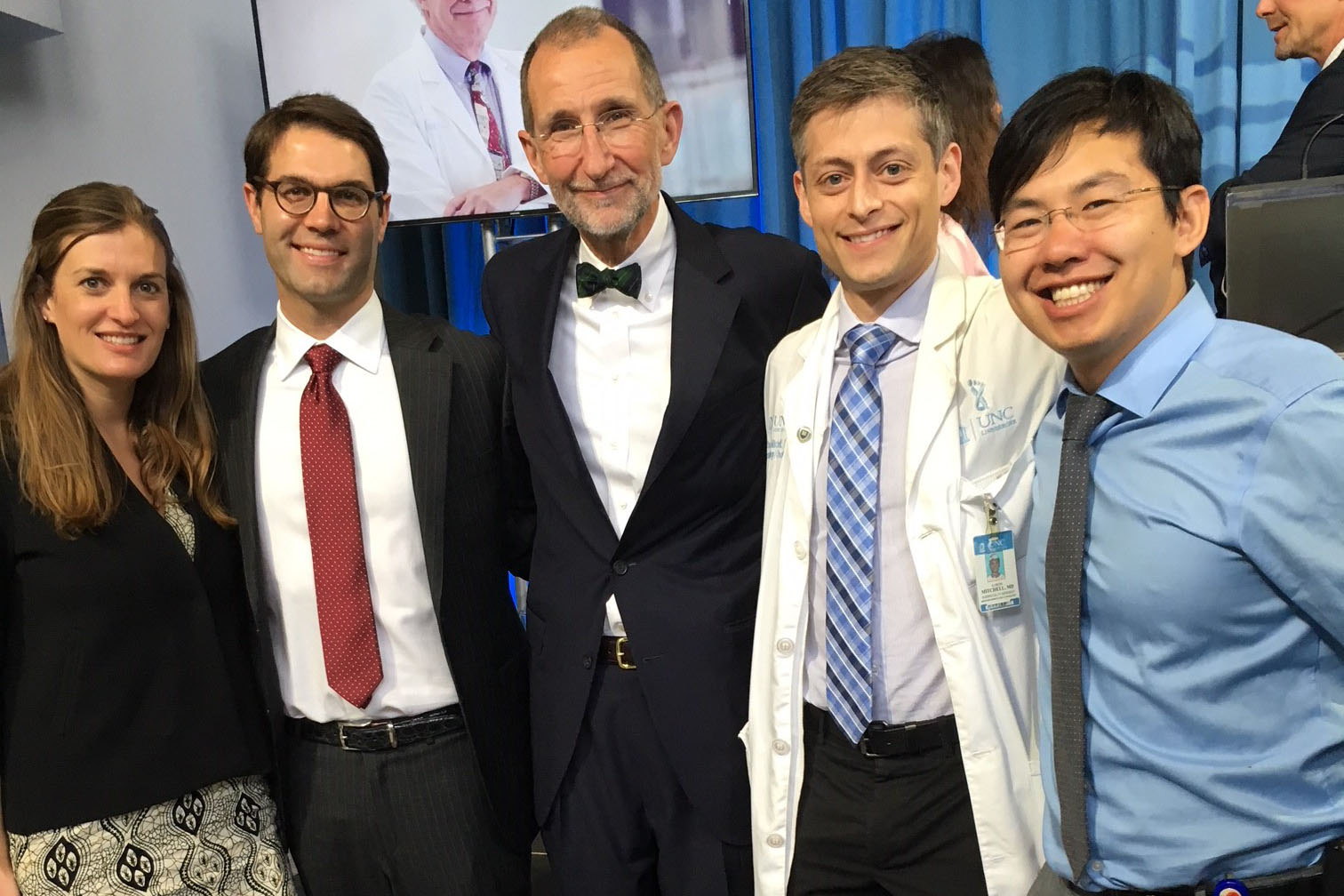
The University of North Carolina Lineberger Comprehensive Cancer Center has recognized four physician-scientists in training as recipients of the 2018 Pope Clinical Trainee Awards based on their dedication to their clinical practice, and their efforts to improve cancer care through research.
The awards, supported by the John William Pope Foundation, are given to emerging physician-researchers in-training based on their excellence in research and clinical oncology practice. The 2018 Clinical Trainee Awards recipients are C. Tyler Ellis, MD, Aaron Mitchell, MD, Kyle Wang, MD, and Kate Westmoreland, MD.
The fellows and residents were honored April 23 as part of a celebration for the John William Pope Foundation, which, in addition to endowing the Clinical Trainee Awards through a gift made in 2014, made a new gift of $5 million to UNC Lineberger for the creation of the “Tomorrow’s Best Hope” Endowed Fellowship Fund. The new fund will generate nearly $250,000 each year for fellowships that are designed to help recruit, educate and train future oncologists.
“It will bridge the gap between treatment and science, drive translational research, and make good on UNC Lineberger’s promise to offer ‘Today’s Best Care and Tomorrow’s Best Hope,’” UNC Health Care CEO William L. Roper, MD, MPH, said of the new gift.
Roper also recognized this year’s Pope Clinical Trainee Awards recipients, who have led research on rectal cancer treatment outcomes, financial conflicts of interest, side effects from brain cancer radiation, and survival for children with blood cancer in sub-Saharan Africa.
Ellis has served as chief resident in the general surgery program, and as a Cecil G. Sheps Center post-doctoral fellow in health services research. He has focused on outcomes for patients with rectal cancer. In a key study, he and his collaborators found that long-term survival for patients receiving chemotherapy and radiation, but not surgery, for rectal cancer – known as off-trial “non-operative management” — was significantly worse than survival for patients receiving conventional treatment. In addition, he found that this was being used disproportionately among black people, the uninsured or Medicaid recipients, suggesting disparities in cancer care.
“He has learned an incredible amount and has become an independent health services researcher,” said UNC Lineberger’s Karyn Stitzenberg, MD, associate professor in the UNC School of Medicine Division of Surgical Oncology. “I have no doubt he will continue to make an impact in the field of colorectal cancer as he moves forward in his career.”
Mitchell has worked as an oncology fellow at the UNC School of Medicine, while completing a master’s of public health degree as a postdoctoral scholar with the Sheps Center. His research has focused on the potential influence of payments for lodging or meals by pharmaceutical companies on prescribing practices by cancer physicians, finding in a study published in the Journal of the American Medical Association Internal Medicine that there was a link between payments by companies and prescribing of that company’s drug for two cancer types.
“Aaron is a talented investigator,” said Ethan Basch, MD, MSc, director of the UNC Lineberger Cancer Outcomes Program and professor in the UNC School of Medicine Division of Hematology and Oncology. “He asks original questions, and tirelessly seeks datasets and analytic approaches that can address these questions.”
Wang, a resident in the department of radiation oncology, has studied side effects from brain radiation in patients who received whole-brain radiation treatment. He focused on the side effect of dry mouth, finding that the degree or severity of these symptoms is related to the radiation treatment dose received by the parotids. He planned to follow up on these findings by comparing the degree of dry mouth between two radiation delivered to spare the parotids, versus traditional radiation.
“I suspect that this study will have a tremendous clinical impact, and may justify a change in the worldwide practice of whole brain (radiation treatment),” said UNC Lineberger’s Lawrence B. Marks, MD, Distinguished Professor and Chair in the UNC School of Medicine Department of Radiation Oncology. “I anticipate that in a few years, based on Kyle’s work, it will become standard practice for radiation oncologists to delineate the parotid glands such that these structures can be systematically avoided during whole brain radiation treatment. So simple, yet so impactful.”
Westmoreland is a pediatric hematology-oncology fellow who has focused on research efforts to improve cancer care for children in sub-Saharan Africa, where survival rates for children with Burkitt lymphoma lag far behind those in the United States. She spent three years living and working in sub-Saharan Africa, including one year as a recipient of a Fogarty Global Health Fellowship working with UNC Project-Malawi. Her planned future research will address poor outcomes for children with Burkitt lymphoma through efforts to improve treatment, quality of life and outcomes for this group.
“Kate is an extremely talented and thoughtful physician and researcher, and has dedicated a significant proportion of her early career preparing to become a leading pediatric global oncology trial investigator,” said UNC Lineberger’s Satish Gopal, MD, MPH, cancer program director for UNC Project-Malawi.
All UNC Health Care clinical faculty are invited to nominate senior fellows based on an outstanding clinical research product and evidence of excellence in clinical oncology practice. A committee made up of all oncology division chiefs and chairs rank the nominees and make recommendations to UNC Lineberger leadership.
